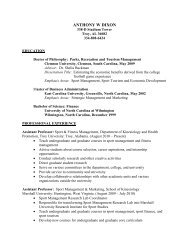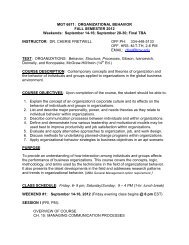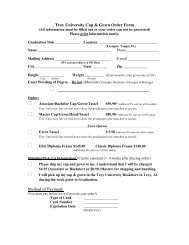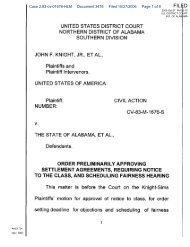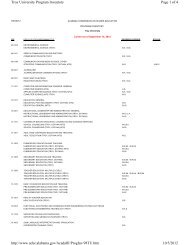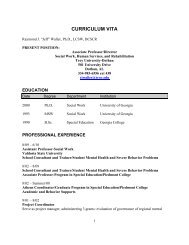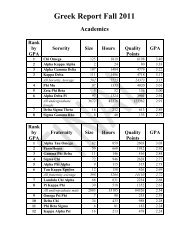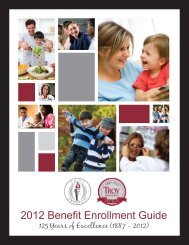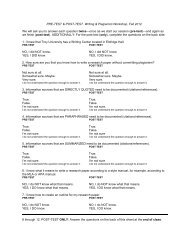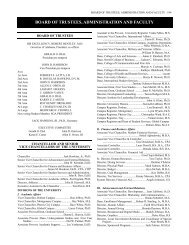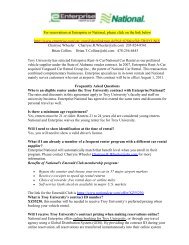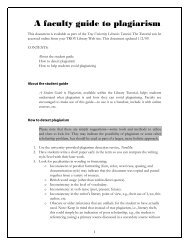2013 Benefit Enrollment Guide - Troy University
2013 Benefit Enrollment Guide - Troy University
2013 Benefit Enrollment Guide - Troy University
- No tags were found...
You also want an ePaper? Increase the reach of your titles
YUMPU automatically turns print PDFs into web optimized ePapers that Google loves.
flexible spending<br />
Flexible Spending Accounts (Flex Corp)<br />
Want an easy way to save money Whether you are married with<br />
kids, single with no children, a single parent, or any other lifestyle<br />
status, a Flexible Spending Account can save you money.<br />
A FSA is actually comprised of two accounts:<br />
• A Health Care Account for health care reimbursement<br />
• A Dependent Care Account for child or elder care reimbursement<br />
How FSAs Save You Money<br />
FSAs allow you to set aside before-tax dollars to cover qualified<br />
expenses that you would normally pay out of your pocket with<br />
after-tax dollars. You pay no federal income, state income or Social<br />
Security taxes on the money you place in your FSA. With just a little<br />
planning, you can increase your net pay.<br />
*Please note that any expense reimbursed through your FSA is not<br />
eligible to be claimed as a deduction or credit on your tax return.<br />
How FSAs Work<br />
First, estimate what your out-of-pocket health care and child/elder<br />
care expenses will be for the year. Based on your estimate, you will<br />
then specify the amount of dollars you want to contribute to your<br />
FSA for the year. For <strong>2013</strong>, you may contribute up to $2,500 to your<br />
Health Care Account and $5,000 to your Dependent Care Account.<br />
Once you begin depositing money into your FSA, you can start<br />
getting reimbursed for eligible expenses. You can be reimbursed up<br />
to the full amount of your annual Health Care Account contribution,<br />
regardless of the amount you have deposited in your account. For<br />
your Dependent Care Account, you can be reimbursed up to the<br />
amount you have deposited.<br />
Please visit www.flexcorp.com for a video about Flexible<br />
Spending. Click on “Participants,” then “Welcome Center.” On<br />
the Welcome Center page, click on “Employee Presentation.”<br />
And, don’t forget about your Flex Card!<br />
You can use your Flex Card at approved providers to instantly<br />
access your account. It allows you to pay for eligible expenses<br />
and services at the point of service by automatically deducting<br />
the amount from your FSA. No hassle and no waiting! Plus, you<br />
can view your account activity and balance any time on-line at<br />
www.flexcorp.com by clicking on Participants and Online Access.<br />
Frequently Asked Questions about FSA<br />
Who is eligible to participate in the FSA plan All full-time<br />
employees who work at least 40 hours per week are eligible to<br />
participate in the plan immediately upon hire.<br />
What is a Dependent Care Spending Account A Dependent<br />
Care Flexible Spending Account is used to pay for eligible<br />
dependent care expenses such as child care for children under<br />
age 13 or day care for anyone who you claim as a dependent<br />
on your Federal tax return who is physically or mentally<br />
incapable of self-care so that you (and your spouse, if you are<br />
married) can work, look for work, or attend school full time.<br />
What qualifies as an eligible expense under a Health Care<br />
FSA or a Dependent Care Spending Account Check the<br />
following page for eligible expenses.<br />
What if I do not use all the money in my account by the end of<br />
the year The Plan starts on January 1st of each year and ends<br />
on December 31st. According to IRS guidelines, any unused funds<br />
will be lost. <strong>Troy</strong> <strong>University</strong> gives you a grace period, which gives<br />
you until March 31st to file your claims. After that date, claims will<br />
no longer be accepted for the previous plan year.<br />
What happens if I terminate If you terminate employment with<br />
the company and you still have money that you have contributed<br />
in your medical reimbursement account, you may elect, through<br />
COBRA, to continue to access those monies for expenses<br />
incurred after your termination date through the end of the plan<br />
year as long as you continue to make your COBRA payments.<br />
Reminder<br />
Regardless of plan year, the only acceptable form<br />
of documentation for reimbursement for OTC drugs<br />
and medicines is a doctor’s prescription, as regulated<br />
by state law. Insulin, medial devices (crutches, blood<br />
sugar monitors, etc.) and items such as bandages,<br />
contact lens solution, denture bond, etc. remain<br />
eligible and will not require a doctor’s prescription.<br />
The new rule applies to all tax-advantaged health<br />
care accounts, including Flexible Spending Accounts<br />
(FSAs), Health Savings Accounts (HSAs), Health<br />
Reimbursement Arrangements (HRAs) and Archer<br />
Medical Savings Accounts (Archer MSAs).<br />
Please call 1-866-688-9727. <strong>Troy</strong> <strong>University</strong> <strong>2013</strong> <strong>Benefit</strong>s <strong>Enrollment</strong> <strong>Guide</strong> 13



